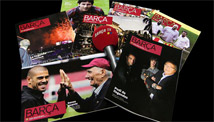FCBARCELONA.CAT
Main menu

Content menu
Football
08.08.2007 22:04
A life dedicated to Barça
www.fcbarcelona.cat
Nicolau Casaus de la Fuente y Jené was born in Mendoza (Argentina) on February 12, 1913.
His father, José, was the son of Lora del Río (Seville) and came from a military family. His
grandfather fought in the Cuban War and his uncle died in combat in Africa. His mother, Gertrudis,
was born in Cervera (Lleida) and was an accomplished pianist although she had to support her modest
family by doing other less glamorous jobs. His parents had two children (Lola and Josep) when they
decided to emigrate to Argentina, where Nicolau Casaus was born along with his brother Robert, who
died early aged just 16.
In 1918, at the end of the First World War, the Casaus family returned to
Catalonia to live in Igualada, after the publishing industry that his father had set up in
Argentina failed to prosper.
His first contact with football
It was in Igualada where Nicolau Casaus first discovered football, and from a young age he
played for the Ateneu club in Igualada. He saw his first Barça match aged 9 years and got to speak
in person to somebody who later became both his idol and intimate friend: Josep Samitier.
His first job was at a printing works in Igualada in 1927, earning five pesetas a week, but
he also had time to go to school for two hours a day.
Founder of the 'Penya Germanor'
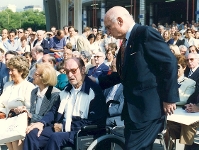 Casaus founded one of the very first Barça supporters clubs, a group of
friends that were called the Penya Germanor. From Igualada he organised transport to get to Les
Corts and also to some away games. In the 1951-52 season, he drove as far as Tetuan to celebrate a
Barça win in the league a week earlier.
Casaus founded one of the very first Barça supporters clubs, a group of
friends that were called the Penya Germanor. From Igualada he organised transport to get to Les
Corts and also to some away games. In the 1951-52 season, he drove as far as Tetuan to celebrate a
Barça win in the league a week earlier.
Aged 24, and in 1937, he married his first wife Pepita Masip Sabat, the daughter of a textile
manager in Igualada and also the cousin of one of the finest right wingers FC Barcelona ever had,
Estanislau Basora.
Nationality and the Civil War
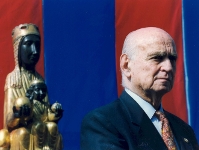 The Spanish Civil War took Igualada by surprise, at a time when Casasus was
working in the family’s textile business. He attempted to sign up for the Republican cause,
but he was officially a foreigner (although he had been registered in the Mendoza consulate, the
papers were never sent to Spain), and he was forced to emigrate instead. Casaus was heartbroken,
because two friends of his who he had encouraged to join the war against fascism were considered
fit for battle.
The Spanish Civil War took Igualada by surprise, at a time when Casasus was
working in the family’s textile business. He attempted to sign up for the Republican cause,
but he was officially a foreigner (although he had been registered in the Mendoza consulate, the
papers were never sent to Spain), and he was forced to emigrate instead. Casaus was heartbroken,
because two friends of his who he had encouraged to join the war against fascism were considered
fit for battle.
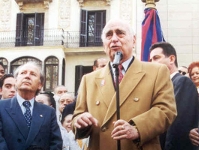 Although he could not go to the front, he played an active role in the
defence of the Republic by writing articles against General Franco and his troops on a weekly basis
in the “Horitzons” magazine. He would suffer because of this and when the Nationalists
won the war in 1939he was arrested at his Igualada home by Franco’s police force. He was
officially condemned as a “red, separatist and supporter of the rebellion”.
Although he could not go to the front, he played an active role in the
defence of the Republic by writing articles against General Franco and his troops on a weekly basis
in the “Horitzons” magazine. He would suffer because of this and when the Nationalists
won the war in 1939he was arrested at his Igualada home by Franco’s police force. He was
officially condemned as a “red, separatist and supporter of the rebellion”.
Sentenced to death
After being submitted to a War Council, he was sentenced to death for 72 days but eventually
got five years in prison instead, where he was put in charge of the prison store. “This way I
won’t starve” he once said. His memoirs also tell us that it was here that he started
smoking cigars and sleeping the siesta. He only thanked the Francoist police for one thing, he was
never tortured.
Once he was freed, his family moved to Carrer Bailen in Barcelona, where he and a friend had
Samitier’s financial support (he would never forget the loan of 400,000 pesetas they
received) to thank for helping them set up a spinning company.
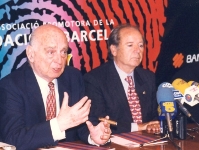 But as a former convict, Casaus had lost his rights as a citizen, and he
would not recover them until 1975, and so he was unable to join the FC Barcelona board of
directors, despite having collaborated in several projects and being one of the masterminds behind
the Penya Solera. Although he was not one of its founders, he was its president for 18 years. He
was also in charge of the Social Commission that oversaw the construction of the Camp Nou on
September 24, 1957. On March 18, 1954, he was one of a group of Barça supporters who carried the
first stone from the old Les Corts stadium to the site of the Camp Nou.
But as a former convict, Casaus had lost his rights as a citizen, and he
would not recover them until 1975, and so he was unable to join the FC Barcelona board of
directors, despite having collaborated in several projects and being one of the masterminds behind
the Penya Solera. Although he was not one of its founders, he was its president for 18 years. He
was also in charge of the Social Commission that oversaw the construction of the Camp Nou on
September 24, 1957. On March 18, 1954, he was one of a group of Barça supporters who carried the
first stone from the old Les Corts stadium to the site of the Camp Nou.
He would have further problems with the Franco regime, twice getting away with threats of
deportation, for he was still officially classed as a foreigner. His first crime was to use Catalan
in a public speech, while his second was to remove the portrait of Franco in the entrance to the
Penya Solera. Samitier, a player Franco felt deep admiration for and considered a friend, and the
academic José María Cossío, were the men who stepped in to support Casaus and managed to ensure
that he was able to remain in the country.
Opponent and candidate
He was a militant Barça supporter and voiced his strong opposition over the years to two of
the club’s presidents, Enric Llaudet (1961-68) and Agustí Montal (1969-77), something he
would go on to reiterate in later years.
His wife died in a traffic accident in 1975, and five years later he married for the second
time to Conchita Sanfeliu Malet.
In 1978 he ran for president of FC Barcelona in representation of the club’s historic
past. He was beaten by Josep Lluís Núñez, but the winner offered him a position as vice president,
which Nicolau Casaus accepted and he went on to work in the social area and for the supporters
clubs, parts of the club with which he always maintained a close link.
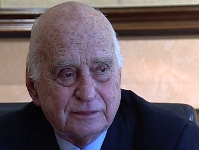
The promoter of Barça supporters clubs
As a Barça director he gained nothing but respect throughout the Spanish football world, and on June 12, 1999 no fewer than 600 supporters clubs were present to pay tribute to his work. He was presented with a bronze bust that is currently on display at the FC Barcelona President Núñez Museum.
Although he first became a member in 1927, he has officially been one since 1948 as he was unable to pay his fees after the Civil War. Since 2000, he was the Honorary President of the Social Area.
Casaus had two children. He received numerous awards during his life, including the Medalla al Mérito Deportivo.
By agreement of the Club’s Board of Directors, in January 2003 he was named Honorary Vice President of FC Barcelona.

